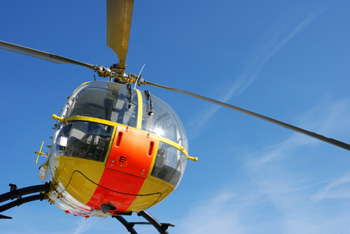 Sept. 30, 2013 – Pilot Jon Orlos was piloting commercial skydiving missions and sightseeing trips when his helicopter hit power lines and crashed, damaging the whirlybird. Now, Orlos and a manager that authorized the flights are liable.
Sept. 30, 2013 – Pilot Jon Orlos was piloting commercial skydiving missions and sightseeing trips when his helicopter hit power lines and crashed, damaging the whirlybird. Now, Orlos and a manager that authorized the flights are liable.
Apparently, the owner of Midwestern Helicopter LLC, John Parrish, did not authorize Orlos to take the helicopter for use in commercial ventures. Parrish had recently notified his staff that commercial events could not be scheduled without written permission.
He sued Orlos and William Coolbaugh, the managing employee that authorized the flights, for conversion and negligence. Orlos lost by default judgment; Coolbaugh lost at trial. The trial court ruled that Coolbaugh was guilty of conspiracy to convert the helicopter, interfering with Parrish's right to possess the chopper.
The defendants were ordered to pay $384,819 in damages. Coolbaugh appealed, invoking a superseding cause defense as well as a public policy argument.
Recently, in Midwestern Helicopter LLC v. Coolbaugh, No. 2013AP60 (Sept. 25, 2013), a three-judge panel for the District II Wisconsin Court of Appeals affirmed.
The panel noted that conversion occurs when someone takes property they don’t own without the owner’s consent and seriously interferes with the owner’s possessory rights.
Damages for conversion, the appeals panel explained, include the “value of the property at the time of the conversion plus interest to the date of trial,” citing another case.
As a manager, Coolbaugh had control of the helicopter, the appeals panel ruled, and gave someone else permission to use it without the owner’s consent. This constituted a conversion.
“Here, Coolbaugh knew that Orlos was taking the helicopter to an event that was prohibited by Parrish’s policy barring commercial events,” wrote Judge Lisa Neubauer.
“Yet Coolbaugh gave Orlos permission to take the helicopter. When Orlos went to the prohibited event and crashed the helicopter, it was a conversion, whether or not Coolbaugh or Orlos was negligent with regard to the accident.”
The appeals panel rejected Coolbaugh’s argument that conversion did not cause the crash, and causation was necessary to attach liability. It noted that causation is not an element of conversion – all that is required is an interference with possessory rights.
In addition, the court rejected Coolbaugh’s contention that public policy and superseding cause should be applied to bar liability.
“Coolbaugh cites no authority applying either rationale in a conversion case,” Judge Neubauer wrote. “We decline to import these negligence defenses into this conversion case, in which the trial court rejected the negligence claim.”
